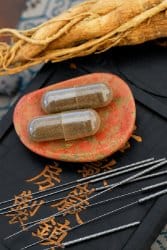Just as some of us take our cars into the shop before parts break down, so can we go to a naturopathic doctor for regular health maintenance. Most licensed NDs in BC provide acupuncture. Gathering information takes only 10 to 15 minutes and results in a customized prescription involving a combination of any of the following: needles, laser, magnets, acupuncture, moxibustion (radiant heat), cupping, acupressure or Qigong.
Acupuncture was originally introduced to the West as a form of anesthesia and pain control. But on closer examination, it has a much broader use in treating conditions such as high cholesterol, fatigue, diabetes, anxiety, depression and insomnia. Acupuncture is also a tool for general disease prevention and health promotion. It is with this final approach in mind that early Chinese writings remind us that a primary role of the physician is to prevent illness from occurring; hence, the attending physician is paid so long as the patient stays healthy. (This is admirable to say the least, but unlikely to happen today unless you work for royalty!)
Usually only one or two sessions with a practitioner licensed to provide acupuncture are needed for an uncomplicated health tune-up. The accomplished acupuncturist, in “grasping the essence” of the person’s energy pattern, applies the treatment with tong shen ming (penetrating divine illumination). Amazingly, China’s master acupuncturists grasp this essence using only one needle at the most efficacious point as the total treatment. Students of acupuncture are told to strive for this so that over their careers, they begin with 10 to 12 needles for a treatment and eventually gain the mastery of using only a few needles for the same results.
Identification of a problem using TCM (for example, in the liver) does not mean that the liver has a Western-style disease pathology. The TCM “liver” describes a particular system of function within the body that can be disturbed but does not show up on standard blood tests. The Chinese approach, besides spotting early warning signs, is most helpful for those individuals who “just don’t feel well” or have symptoms for which all the standard medical tests show negative results. The following are the diagnostic tools used to assess the body’s imbalances in Chinese medicine.
- Pulse diagnosis: Beyond the cardiovascular assessment of a pulse rate, there are 12 identifiable pulse positions (six on each wrist).
- Tongue diagnosis: the colour, shape and types of tongue coating give information about blood and lymph flow in the internal organs and digestive tract.
- Abdominal signs: Muscle tension and discolouration on the abdomen are helpful in determining internal organ stresses.
- Meridian assessment: Techniques are used to evaluate the 12 main meridians (similar to the 12 pulses), plus the additional eight extra meridians that interconnect energies between the main 12.
- Ten questions: Interview techniques elicit specific general traits experienced by the patient, such as body temperature, thirst levels, urine and stools, types and preferences of food and drink.
Best Times for a Tune-Up
Sometimes life creates increased stresses and strains on the body and mind, and each emotion affects a particular organ. Organ strain can also result from seasonal changes, and an individual’s weak season is determined by signs in the body’s energy rhythms. (In China, acupuncture is traditionally used in the warmer months versus herbal treatment during the winter.) We all have one inherent weakness from birth: liver, heart, spleen, lung or kidney, so it’s important to pay attention to inherent organ weakness. In all these cases, acupuncture is effective for balancing and strengthening both mind and body.
Acupuncture utilizes the messages that our bodies constantly give us through a rich and decipherable language. Paying attention to those messages provides a means for keeping the mind and body whole and renewing the connection to nature.
About the Author
A licensed naturopathic doctor and professor at the Boucher Institute of Naturopathic Medicine in Vancouver, Dr Paul Levendusky runs a private practice in White Rock, BC.
Acupuncture in BC
Naturopathic doctors have been licensed in BC since 1923. NDs have been providing acupuncture in BC longer than any other health discipline. The regulatory college oversees acupuncture education for NDs. This includes certified evidence of a minimum of 200 hours of study in Traditional Oriental Medicine, which must include: Syndrome differentiation and formulation of point prescriptions; Traditional acupuncture anatomy, physiology and pathology; Acupuncture and Moxibustion techniques and point location. Additionally, there must be certified evidence of a minimum of 50 hours of supervised clinical training by a licensed acupuncturist or TCM practitioner.

